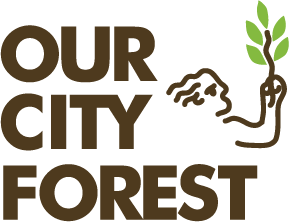I recently made my way down highway 101 from the Bay Area to San Diego. Agriculture lined the highway as I drove South. There are endless fields of fruit trees, vegetable plants, and grape vines. I recall reading a statistic during the 2016 Presidential election that California is responsible for nearly 15% of the United States’ total fruit and vegetable production. This statistic was reported because of talk that California wanted to secede from the United States and become its own country, and that it could sustain much of its GDP on agriculture. As I drove down highway 101, I noticed many workers in the fields, bare-backed and bent over the rows of produce. I thought about how much food I consume from these Californian farms, and how many of the workers in these fields have picked food for me. I don’t think enough people think about how we get food on our tables each day.
Having worked outside planting trees with Our City Forest for the past two years, I have learned that physical labor is extremely intense on the body. It is challenging to brave the elements all day long. It is even harder to repeat physical labor day after day, with very few breaks. Seeing the farm workers bent over picking produce hurts my own back; and they are doing this type of work day after day because society requires food, rain or shine.
Not only is agricultural work physically reprimanding, but these workers are also exposed to pesticides and herbicides. These contaminants are proven to be harmful to human health, and to even cause certain disabilities. The health effects do not only impact the workers in the fields, but also their families and entire communities. It is unfair that agricultural workers are expected to sacrifice their personal health and wellbeing purely to make a living. Oftentimes, these workers are paid below the minimum wage, making it even harder for them to support themselves and their families. Many of the farms get away with paying their employees less than the legal minimum wage because they hire immigrants without citizenship. This opens the door to unethical treatment of the workers, as the farm owners are not bound to U.S. law therefore do not need to treat their employees by law. Not only do the farm owner’s pay below minimum wage, they often pay their employees by the number of bushels of food they are able to pick during a day’s work. This means that employees are forced to hustle while on the job. Imagine adding running into a physically laborious job - seems awful, no?
Immigrants from Mexico working a Strawberry Farm near Guadalupe, CA (LA Times, 2017).
Since the agricultural business is extremely tough work and taxing on the body, it is not a popular field to choose to enter. Most field workers end up at these jobs out of desperation for any sort of employment. The low wages cause a trend of generations to remain working in the fields, in which the children end up at the same job as their parents just to be able to make ends meet. It is so unfortunate that the rights of these workers are undervalued and mismanaged. This is where Cesar Chavez’s story comes to light.
Cesar Chavez at UFW (NPR, 2016).
Cesar Chavez helped bring these issues to the forefront of human rights, and show the problems that are not addressed within the agricultural world. His parents had immigrated from Mexico, and ended up working at a farm in Yuma, Arizona where Chavez was born in 1927. Chavez was not an illegal immigrant himself, but was treated differently due to his family’s background. His background contributed to his fight for rights for farm workers, in which he brought to light the xenophobic maltreatment of immigrant workers. There are so many layers to Chavez’s union work - it wasn’t entirely about increasing wages, but about the inclusion of immigrants in the workforce. The United States has been and continues to be a xenophobic country, particularly towards Latin Americans. The majority of the policies surrounding immigration are indirectly targeted towards Latin Americans. These policies allow farmer owners to expose their employees to harsh and poor working conditions. Chavez pushed to repair the rough reality that farm workers face. His efforts in forming the United Farm Workers association paved the road as the first union to fight for the rights of agricultural employees. Chavez helped create UFW’s image - an Aztecan eagle and the phrase ‘Viva la causa’. Both symbolize the workers’ heritage, with the eagle signifying pride for Latin American culture and the phrase providing strength and power to the workers. The phrase is also in Spanish, connecting its significance to the racial undertones of the entire agricultural movement that Chavez started.
A UFW organized march in Oxnard, CA - Theresa Romero holds the UFW Flag bearing the Eagle symbol (KCRW, 2018).
As I drove down to Southern California the other day, I thought about the workers’ rights as I passed them on the highway. I’m not convinced that as a country we really offer our agricultural workers many rights, especially if they are immigrants. Yet I believe the workers would be worse off without the work of Cesar Chavez and the United Farm Workers. Chavez’s legacy is still relevant, and should be talked about more so that we can continue to fight for worker’s rights. I hope today you think about the food on your table and the people who worked to get it there. Most importantly, I hope you share this knowledge with someone. Knowledge is power, and educating others is prescient in developing change. We still have work to do in honoring Cesar Chavez’s legacy.




